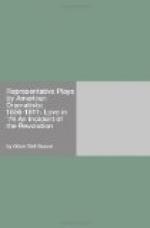Except in the instances of our comedians, like Murdoch, with his “lightness of manner, that grace, which I have described elsewhere as snuffing a candle in a way to make you feel that snuffing candles is the poetry of life;” Harry Placide, with whose retirement went the retirement of Sir Peter Teazle and Sir Harcourt Courtley, ("When Placide and Gilbert are gone,” he writes, “Sheridan will have to be shelved"); Holland, with his intense fun in eccentric bits; Brougham, without whom “The Rivals” is difficult to endure—apart from these the stage of the time, to Bunce, was not all it should be. He valued at their worth the romantic extravagances of the Wallack family; he applauded the sound judgment, and deplored the hard manner of Davenport; he viewed calmly what he regarded to be an overestimation of Edwin Booth—one of the first criticisms of an avowedly negative character I have seen aimed directly at this actor. In other words, Bunce fought hard against the encroachment of the new times upon the acting of his early theatre days. The epitome of his old-time attitude is to be found in Appleton’s Journal for April 3, 1869. His better mood was to be met with in his discussion of the players of Ellen Tree’s type. Here are his words of censure against the new order:
“If we old files are to be believed, the art of acting is dying out, and the very tradition of the stage disappearing.... Very likely the spirit, which in painting we call pre-Raphaelism, is obtaining its influence on the stage, and that some of the actors are turning out of doors the traditions and formal mannerisms of the schools, and going back to nature and truth for their inspiration.... There were very artificial methods, no doubt, among the old actors, but there was also a very consummate knowledge of the art, a great deal of breadth, force and skill, and a finished training, which the new schools do not exhibit. In aiming to be natural, some of our actors seem to have concluded that their profession is not an art. They grow heedless in the delivery of language, weakening or obscuring its meaning, and missing its significance; and in some way lose that rich and mellow colouring that characterized the bygone performers. So marked is this, that some of the old dramatic characters are abandoned altogether, because in the hands of the Realists they fade away into ineffective and colourless forms. The Sir Peter Teazles and Sir Anthony Absolutes of the old comedy require indispensably the resources of the old art, and no thin, water-gruel realism, so-called, can personate them. In avoiding the declamatory Kembletonianism of the old school, our actors are right enough; but they cannot safely disregard the skill which sharpens and chisels, as it were, the sentences; nor forego the care, study, precision and stern adherence to rules of art, that marked the old stage.”
Steeped in such belief, it is small wonder that two of Bunce’s plays had characteristics in them to suit a member of the Wallack family. And being such a lover of old English Comedy accounts for some of the spirit of “Love in ’76.”




